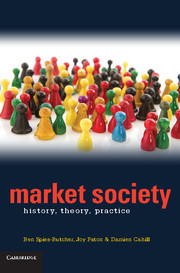Book contents
- Frontmatter
- Contents
- Acknowledgements
- 1 Introducing market society
- Part 1 Constituting market society
- Part 2 Regulating market society
- Part 3 Living market society
- 8 Work, consumption and quality of life
- 9 Family, environment and sustainability
- 10 Civil society, community and participation
- Concluding remarks
- References
- Index
8 - Work, consumption and quality of life
from Part 3 - Living market society
Published online by Cambridge University Press: 05 June 2012
- Frontmatter
- Contents
- Acknowledgements
- 1 Introducing market society
- Part 1 Constituting market society
- Part 2 Regulating market society
- Part 3 Living market society
- 8 Work, consumption and quality of life
- 9 Family, environment and sustainability
- 10 Civil society, community and participation
- Concluding remarks
- References
- Index
Summary
IT IS AS WORKERS and consumers that most of us directly experience the economy. Waged work is central to market society. It gives us meaning, provides income and fosters the division of labour that helps generate growth. This led many to see modern economies as ‘work societies’, while more recent changes to the nature of work have led others to argue that consumerism dominates our lives. Here we explore the development of the mass production model of Fordism, and the more flexible, diverse and precarious work arrangements that followed. We also look at the link between work, leisure and consumption and the growing role consumerism plays in our lives. Finally, we examine what this means for our quality of life.
WORK AND SOCIETY
Many early theorists of capitalism argued that the nature of work defined the new economic system. An important issue was how changes in the world of work shaped both the economy and everyday life.
- Type
- Chapter
- Information
- Market SocietyHistory, Theory, Practice, pp. 165 - 188Publisher: Cambridge University PressPrint publication year: 2012



